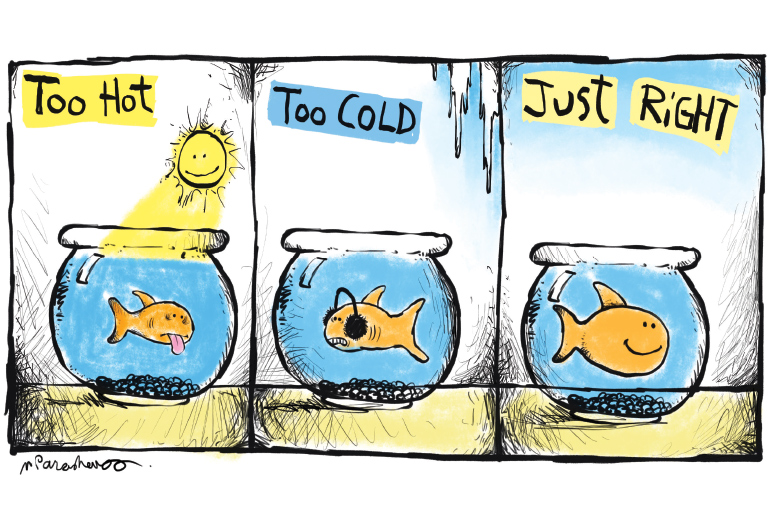Hamptons Overfished? Report Says No, They've Swum for Cooler Water

A study appeared recently in the journal Science that has serious ramifications for the East End. It stated that from 1930 to 2010 the total number of metric tons of fish in the ocean declined by 4%.
“That 4% decline sounds small,” said Chris Free, who led the team that created the study. “But it’s 1.4 million metric tons of fish.”
Free was interviewed in The New York Times. The article was titled “The World Is Losing Fish to Eat as Oceans Warm, Study Finds.” It was a tremendous study involving hundreds of locations and tens of thousands of data points around the globe.
The study was designed to separate the effects of warming waters from other factors, like overfishing. So it was a clear study of what the warming waters had done.
“Fish are like Goldilocks,” one of the study’s coauthors, Malin Pinsky, told the Times. “They don’t like their water too hot or too cold.” And if the water warms, they will swim to where they find the water more to their liking.
The study is so thorough it could break out the changes by fish species. Some species actually increased in certain places and some decreased. And it broke out the data by ocean and even by which part of the ocean. Ocean water temperatures were not all rising uniformly around the globe. And the increase or decrease of the fish population could be measured. And here’s where a statement in the Times article hit me like a ton of bricks. The two areas with the greatest loss of fish population during this 40-year study period were the Sea of Japan and the northeast Atlantic Ocean, where fish populations fell by, in some cases, an astounding 35%.
And we all were told the decline in the fisheries was our fault. It’s been beaten into the heads of our local fishermen by certain parties at the National Marine Fisheries Service that all would be fine if the fishermen did not break the law and take too many fish of a certain species. Indeed, at certain times over the years the NMFS unit that polices the fishermen has seemed to consider them the enemy, needing to be punished for even the slightest infraction. There was a period of about 10 years when officers might seize a fisherman’s pickup truck for even the most trivial infraction. It got so bad that it became a scandal.
Headquarters for the NOAA unit covering the East End was based in Connecticut, and a newspaper in Gloucester, Massachusetts, reported about numerous cases where fisherman complained they were being treated like criminals, or worse. Testimony stated that the fisherman had been “subjected to unfair treatment, cited for seemingly arbitrary violations and charged exorbitant fines.” This money—more than $8.4 million was in there by the end of 2009—was part of the investigation, since the NOAA actually retained the proceeds from the enormous penalties they were handing out. “It is very troublesome that there is inadequate auditing of this money, which is deposited into the Asset Forfeiture Fund…We should question whether allowing the agency to keep those collected penalties provides some sort of perverse incentive for officials to levy excessive fines?”
Regarding the climate change study and situation, I spoke to Emerson Hasbrouck, a biologist with the Cornell University Fisheries Office in Riverhead. Indeed, “summer flounder and black sea bass distribution has shifted northward due to global warming,” he said, so fisherman from the south have come north into these waters to fish for them. Meanwhile, I don’t believe our local fishermen were allowed to fish for what the southerners were landing.
RELATED – Catch & Eat: Fishing Regulations + Cooking Tips for the East End’s Freshest Fish
As I said, this study carves out the effect of overfishing. The 35% decline is entirely about the fish migrating elsewhere, leaving us with less fish overall. And so it is hard to imagine that overfishing would involve any great numbers, especially after the years of punishment doled out by the state DEC and the federal NMFS in those bad years.
The early years of Dan’s Papers and The Montauk Pioneer are now online at NYHistoricNewspapers.org, and if you go and look us up, you will find many stories about Montauk Harbor and the giant swordfish, sailfish, striped bass and tuna caught on rod and reel and bushels of porgies and cod brought in by happy open boat fishermen from up island during those years.
One week featured a photo I took of a 20-foot-long two-ton shark lying dead on the dock at Salivar’s in Montauk, with his mouth partly open and his giant tongue hanging out onto the deck from between his razor sharp teeth on that side. The killer had come in lashed to the side of Frank Mundus’s fishing boat, which was listing to that side because of the weight. It couldn’t be considered a world record, though. Although it was heavier than the current world record, it was ineligible because Frank had it shot with a rifle. I ran it on the front page.
Goldilocks, where are you? Come back please. The water is just right, not to cold and not too hot.



